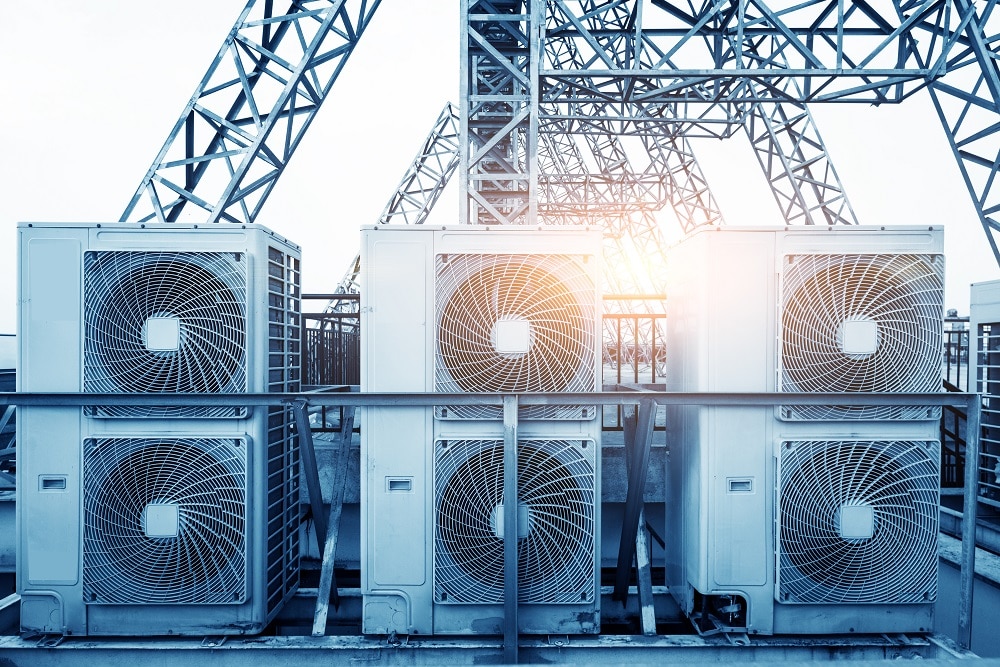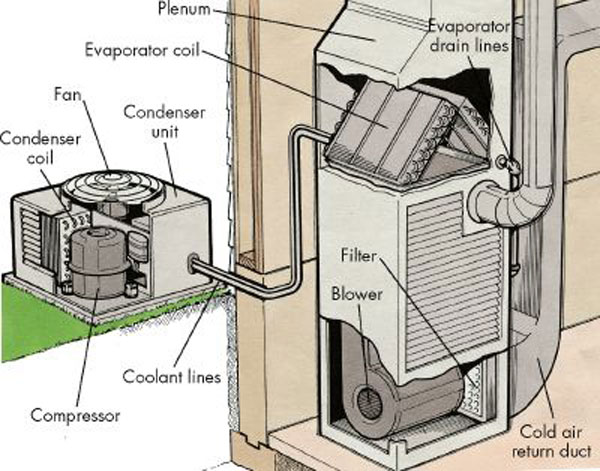Find out how HVAC experts provide affordable indoor air solutions
Wiki Article
Discovering the Necessary Parts of a Reliable HVAC System
A reliable HVAC system is built on a number of essential parts that operate in consistency. Each part, from the thermostat to the ductwork, plays an important duty in keeping convenience and energy effectiveness. Understanding these components is essential for maximizing efficiency and improving interior air top quality. As one examines these parts, the elaborate connections between them reveal understandings right into improving general system effectiveness. What details aspects contribute most to this performance?The Duty of the Thermostat in HVAC Performance

Although commonly forgotten, the thermostat plays an essential role in the performance of HVAC systems. HVAC experts. This small device works as the key nerve center, regulating temperature level setups and making certain perfect comfort within an area. By properly noticing the ambient temperature, the thermostat interacts with the heating, ventilation, and air conditioning systems to keep the wanted environment
An efficient thermostat reduces power consumption by turning on the HVAC system only when necessary, consequently avoiding extreme home heating or cooling. Modern programmable and smart thermostats improve this effectiveness further by enabling customers to establish schedules and from another location change settings, adapting to day-to-day regimens.
In addition, the placement of the thermostat is vital; inappropriate location can result in incorrect temperature analyses, resulting in ineffective procedure. In general, a well-functioning thermostat not just enhances convenience but additionally contributes significantly to energy financial savings and the longevity of the a/c system.
Recognizing the Value of Air Filters
Air filters serve an important feature in heating and cooling systems by ensuring that the air flowing within an area continues to be clean and healthy. These filters catch dirt, irritants, and other toxins, avoiding them from being recirculated throughout the setting. By capturing these particles, air filters add to boosted indoor air top quality, which can significantly benefit residents' health and wellness, particularly those with allergic reactions or respiratory system problems.Additionally, keeping tidy air filters improves the performance of HVAC systems. Clogged up filters can limit airflow, causing the system to work more challenging to preserve wanted temperature levels, bring about boosted energy consumption and greater utility expenses. On a regular basis changing or cleansing filters is a vital upkeep action that can prolong the life-span of HVAC devices. Ultimately, recognizing the importance of air filters permits house owners and building managers to take aggressive measures to ensure a well-functioning, reliable heating and cooling system that advertises a secure and comfortable interior environment.

The Capability of the Furnace and Heatpump
Heating systems and heatpump are crucial components of cooling and heating systems, accountable for offering warmth throughout colder months. Heaters operate by home heating air via combustion or electric resistance, then distributing it throughout the home by means of air ducts. They typically use quick heating and can be fueled by all-natural gas, electricity, or oil, depending on the system kind.On the other hand, heat pumps transfer warmth rather than generate it. They draw out warmth from the outside air or ground, even in reduced temperatures, and transfer it indoors. HVAC experts. This twin functionality permits warm pumps to likewise offer air conditioning in warmer months, making them versatile options for year-round environment control
Both systems require appropriate upkeep to assure efficiency and long life. While heaters master severe cold, warmth pumps can be helpful in modest climates. Comprehending their distinctive capabilities help house owners in picking the most suitable alternative for their heating needs.
Exploring the A/c Device
The cooling device is a vital component of heating and cooling systems, offered in various types to fit various needs. Recognizing the performance scores of these units is vital for making educated selections about power usage and price. This area will certainly check out the diverse sorts of ac system and clarify exactly how efficiency scores effect performance.Kinds Of Air Conditioners
While various variables affect the choice of air conditioning systems, comprehending the various types offered is crucial for property owners and building supervisors alike. Central air conditioning conditioners are developed to cool down entire homes or buildings, using a network of air ducts for airflow. Window units provide an even more local service, perfect for single spaces or little spaces. Portable a/c supply flexibility, allowing customers to move the system as required. Ductless mini-split systems are another alternative, incorporating the effectiveness of main systems with the ease of zoning, as they need no ductwork. Ultimately, geothermal systems harness the planet's temperature for energy-efficient cooling. Each kind comes with unique benefits, making informed selections important for efficient climate control.
Efficiency Scores Discussed
Recognizing efficiency rankings is necessary for picking the right air conditioning unit, as these metrics offer understanding into the system's performance and energy intake. The most usual ranking for a/c is the Seasonal Power Effectiveness Ratio (SEER), which determines the cooling result during a common air conditioning season split by the overall electrical energy input. A greater SEER shows far better efficiency. Additionally, the Energy Efficiency Proportion (EER) is used for measuring performance under certain problems. One more essential metric is the Energy Star accreditation, which signifies that a device meets stringent power efficiency guidelines. By reviewing these rankings, consumers can make educated choices that not just maximize convenience yet likewise minimize energy expenses and ecological impact.The Relevance of Ductwork and Air flow
Efficient ductwork design and air movement management play essential functions in the total effectiveness and efficiency of a/c systems. Proper ductwork assurances that conditioned air is dispersed equally throughout a space, reducing temperature level changes and enhancing comfort. Well-designed air ducts lessen resistance to airflow, decreasing the work on cooling and heating equipment and eventually reducing energy consumption.Airflow monitoring includes strategically placing vents and signs up to boost the circulation of air. This prevents typical issues such as chilly or warm areas, which can occur when air flow is obstructed or improperly well balanced. In addition, the appropriate air duct materials and insulation can additionally improve effectiveness by decreasing warm loss or gain throughout air transit.
An effective ductwork system not just adds to power cost savings but can also prolong the life-span you can try these out of HVAC equipment by reducing unneeded stress (HVAC experts). Subsequently, recognizing the significance of ductwork and airflow is necessary for achieving peak HVAC system efficiency
Routine Maintenance Practices to Boost Performance
Routine upkeep techniques are important for visite site making certain peak efficiency of a/c systems. These techniques consist of regular examinations, cleansing, and needed repair work to maintain the system running effectively. Regularly changing air filters is crucial, as blocked filters can block air movement and lower performance. Furthermore, specialists must check and tidy evaporator and condenser coils to prevent getting too hot and power wastefulness.Yearly professional assessments are additionally advised, as experienced specialists can determine possible problems before they escalate. Oiling relocating components decreases deterioration, adding to a longer life expectancy for the system. Making sure that the thermostat functions correctly aids in keeping optimal temperature level control.
Frequently Asked Inquiries
How Usually Should I Replace My Thermostat?
Thermostats ought to commonly be replaced every 5 to 10 years, relying on use and innovation developments. Regular checks are advisable to assure peak performance, particularly if experiencing irregular temperature level control or boosted power costs.What Dimension Air Filter Is Ideal for My HVAC System?
The very best dimension air filter for a heating and cooling system varies by unit style. Commonly, it's crucial to speak with the proprietor's handbook or examine the existing filter dimensions to guarantee peak performance and air quality.Can I Set Up a Warmth Pump Myself?
Mounting a heatpump independently is feasible for skilled individuals, yet it requires knowledge of electric systems and neighborhood codes. Employing a professional is advised to assure appropriate installation and suitable system performance.How Do I Know if My Ductwork Is Effective?
To establish ductwork performance, one ought to inspect for leaks, procedure air flow at vents, examine insulation top quality, and evaluate temperature level differences between supply and return air ducts. Expert assessments can supply detailed understandings right into general efficiency.What Are Indications My HVAC Demands Immediate Maintenance?
Indicators that a cooling and heating system needs instant maintenance consist of unusual sounds, irregular temperatures, raised energy expenses, unpleasant smells, and frequent cycling. Resolving these concerns promptly can protect against additional damages and assurance height system performance.Air filters serve a necessary feature in A/c systems by assuring that the air distributing within a room remains tidy and healthy. Additionally, preserving tidy air filters improves the efficiency of A/c systems. Ductless mini-split systems are another alternative, incorporating the efficiency of central systems with the ease of zoning, as they require no ductwork. Recognizing efficiency ratings is necessary for picking the right air conditioning device, as these metrics give understanding into the system's performance and power consumption. The best find out here now size air filter for an A/c system differs by device design.
Report this wiki page